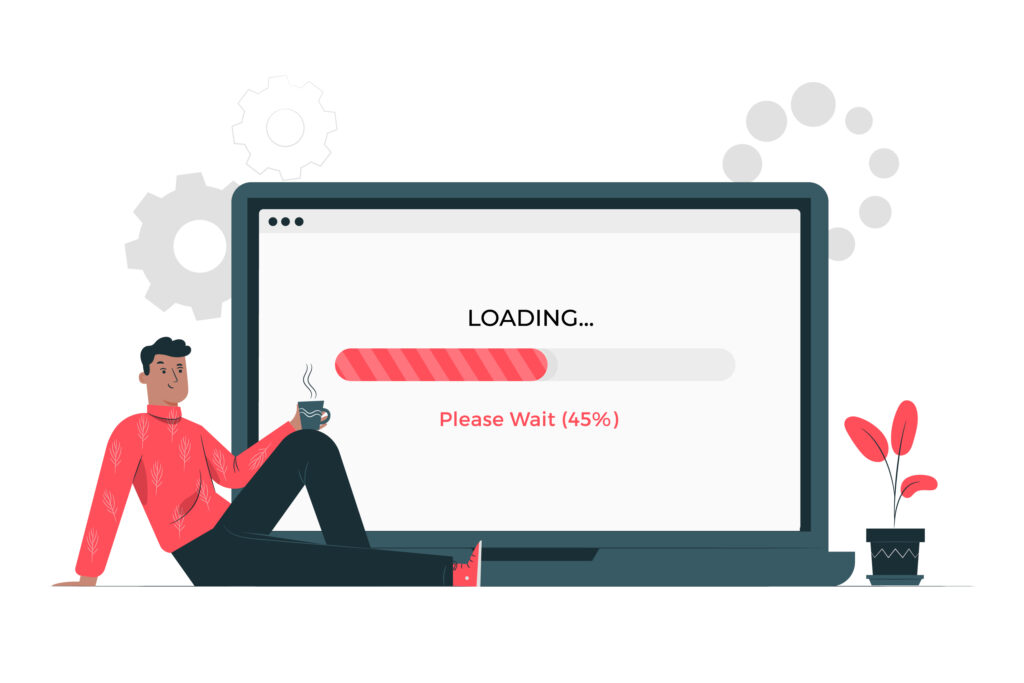You might not realize it, but the speed at which your website loads can have a major impact on the overall success of your online presence. Page speed, or the amount of time it takes for the content on your website to load completely, is not only crucial for providing an excellent user experience, but it also plays a significant role in how search engines like Google rank your site.
If you want to ensure that your website is performing at its best, it’s time to pay close attention to your page speed.
Well, what is page speed and why does it matter, you ask?
Well, in today’s fast-paced digital world, users expect websites to load quickly and seamlessly. A slow-loading site can lead to high bounce rates, lost conversions, and, ultimately, lower search engine rankings, affecting your online visibility and potential revenue.
So, don’t let poor page speed hold you back – by understanding its importance and implementing strategies to improve it, you can create a better user experience, boost your search engine rankings, and increase the likelihood of achieving your online goals.
Defining Page Speed and How it is Measured
Page speed’s essentially how fast a webpage loads, and it’s measured using a mix of lab data and real-world user data ’cause it plays a crucial role in user experience, search rankings, and conversion rates.
Lab data refers to the metrics collected in a controlled environment, such as Google’s Lighthouse tool, which tests a webpage’s performance under various conditions. Real-world user data, also known as field data, is collected from actual users interacting with the page. By combining both types of data, you get a comprehensive understanding of how your page performs and where improvements can be made.
Now, you might be wondering why page speed matters so much. Well, besides the obvious fact that nobody likes waiting for a slow page to load, it directly impacts your website’s success.
A faster page speed means a better user experience, leading to higher user engagement and lower bounce rates. This, in turn, contributes to improved search engine rankings, as Google and other search engines prioritize fast-loading websites in their search results.
So, by optimizing your page speed, you’re not only delighting your users but also improving your website’s visibility and reach.
To sum it up, page speed is a key factor in creating a seamless and enjoyable online experience for your users, and it should never be overlooked. By measuring and optimizing your page speed using both lab and real-world user data, you’re investing in the long-term success of your website.
So don’t let a slow-loading webpage hold you back – take advantage of the tools and techniques available to ensure your site is fast, efficient, and user-friendly.
The Impact of Page Speed on User Experience
When navigating a website, you’ll quickly notice the difference a fast-loading site can make to your overall experience, as it keeps you engaged and encourages further exploration. A slow-loading site, on the other hand, can be frustrating and may lead you to abandon the page in search of a better, faster alternative.
In today’s fast-paced digital world, page speed has become a critical factor in delivering a positive user experience and ensuring your visitors stay on your site. A high page speed not only makes navigation more enjoyable but it also impacts user engagement and conversions.
Moreover, a fast-loading site can help build trust and credibility with your audience, as it shows that you value their time and have invested in providing a seamless browsing experience. By optimizing your site’s page speed, you’re not only improving the user experience for your visitors, but you’re also giving your site a competitive edge in search engine rankings.
Google now considers page speed as a ranking factor, which means that faster sites are more likely to appear higher in search results. A higher ranking translates to increased visibility and more organic traffic to your site. So, don’t overlook the importance of page speed – invest in optimizing your site for faster load times and reap the benefits of improved user experience, higher conversions, and better search engine rankings.
The Relationship Between Page Speed and Search Engine Rankings
It’s no secret that a quick-loading website is like a well-oiled machine, smoothly guiding users through its content and leaving a lasting impression on search engine rankings.
Search engines like Google and Bing use page speed as a ranking factor, as they aim to provide their users with the best possible results. A fast website not only improves user experience but also demonstrates to search engines that your site is well-built, optimized, and deserving of a higher ranking.
As a website owner, you should be aware that search engines place a high value on providing the most relevant and useful content to their users. If your site takes too long to load, visitors may leave before even seeing your content, resulting in a higher bounce rate.
Search engines take note of this and may penalize your site with lower rankings, making it difficult for potential customers to find your business. By investing time and effort into improving your page speed, you’re not only enhancing the user experience but also giving your site a competitive edge in search engine results.
Don’t underestimate the impact of page speed on your search engine rankings. With the increasing number of businesses competing for online visibility, you should take every opportunity to stand out from the crowd.
Ensure your website loads quickly and efficiently to keep both users and search engines happy, ultimately driving more traffic to your site and boosting your online presence. Remember, a fast-loading website is not just a luxury – it’s a necessity in today’s digital landscape.
Strategies for Improving Page Speed
Boosting your website’s performance can’t be overlooked, and implementing effective strategies to enhance load times will create a seamless experience for users while improving your search engine standing. There are several approaches you can take to improve your page speed, from optimizing images and code to utilizing content delivery networks (CDNs) and caching. By adopting these strategies, you’ll not only improve user satisfaction but also have a competitive edge over slower-loading websites.
First, optimize your images by compressing them without sacrificing quality, using tools like TinyPNG or JPEGmini. Scaling images to the exact dimensions required can further reduce their file size.
Additionally, streamline your website’s code by minifying CSS, JavaScript, and HTML files, which removes unnecessary characters and spaces, resulting in faster load times. Another option is to implement ‘lazy loading,’ which only loads images and other media as users scroll down the page, reducing the initial load time.
Leverage browser caching and server-side caching to store parts of your website on the user’s device, reducing the need for repeated downloads of the same content. This leads to quicker load times for repeat visitors.
Content delivery networks (CDNs) are another effective strategy for boosting page speed. CDNs distribute your website’s content across multiple servers in different locations, ensuring users access the content from the closest server, resulting in faster load times.
By taking these steps and continually monitoring your website’s performance, you’ll provide an optimal experience for users and maintain a strong online presence.
Tools for Measuring and Monitoring Page Speed Performance
To ensure your website’s performance remains top-notch, you’ll need to measure and monitor its load times using various tools available in the market. These tools will help you identify areas of improvement, optimize your site’s performance, and provide a seamless user experience.
By investing time in monitoring your website’s speed, you’re not only improving its overall functionality but also boosting your search engine rankings and customer satisfaction.
Some of the popular tools you can use to measure and monitor your page speed performance include Google PageSpeed Insights, GTmetrix, WebPageTest, and Pingdom. These tools provide valuable insights on how quickly your site loads, potential bottlenecks, and recommendations for optimization.
Additionally, they offer comprehensive reports that can help you better understand the performance of your website and prioritize the necessary changes.
Don’t underestimate the importance of your website’s speed, as it directly impacts user satisfaction and engagement. By leveraging these tools to measure and monitor your page speed performance, you’re taking a proactive approach to ensure your website remains competitive and provides an exceptional user experience.
Remember, a fast-loading website is crucial for retaining customers, increasing conversions, and maintaining a strong online presence.
Frequently Asked Questions
How does page speed affect mobile users differently than desktop users?
Page speed impacts mobile users more due to slower loading times, potential data usage, and limited processing power. A faster site keeps them engaged, reduces bounce rates, and boosts conversion rates. Don’t risk losing customers!
Are there any specific industries or types of websites for which page speed matters more than others?
Absolutely! E-commerce, news, and media websites rely heavily on fast loading times to keep users engaged. As a business owner, prioritizing page speed can greatly improve user experience and conversion rates.
How can web hosting services impact a website’s page speed, and what should one consider when choosing a hosting provider in terms of page speed optimization?
Web hosting services greatly impact your website’s page speed. Choose a provider offering fast servers, solid-state drives, and efficient content delivery networks to ensure optimal page speed and better user experience.
What are some common website design mistakes that can negatively impact page speed, and how can they be avoided?
Avoid common design mistakes like heavy images, excessive plugins, and complex code to improve page speed. Optimize images, minimize plugin use, and streamline code for a faster, more user-friendly website experience.
What role do content delivery networks (CDNs) play in improving page speed, and when should a website consider using a CDN?
CDNs boost your site’s page speed by distributing content across multiple servers worldwide, reducing latency. Consider using a CDN when targeting a global audience or if high traffic strains your server resources.
Conclusion
So, you’ve now seen what is page speed and does it matter; how crucial page speed is for both user experience and search engine rankings. Don’t let slow-loading pages hold you back any longer.
Now’s the time to take action, optimize your website, and provide your customers with the seamless, hassle-free experience they deserve.
Remember, numerous tools and strategies are available to help you improve your page speed. Don’t hesitate to explore and utilize them.
Boost your website’s performance and watch your online success soar!




